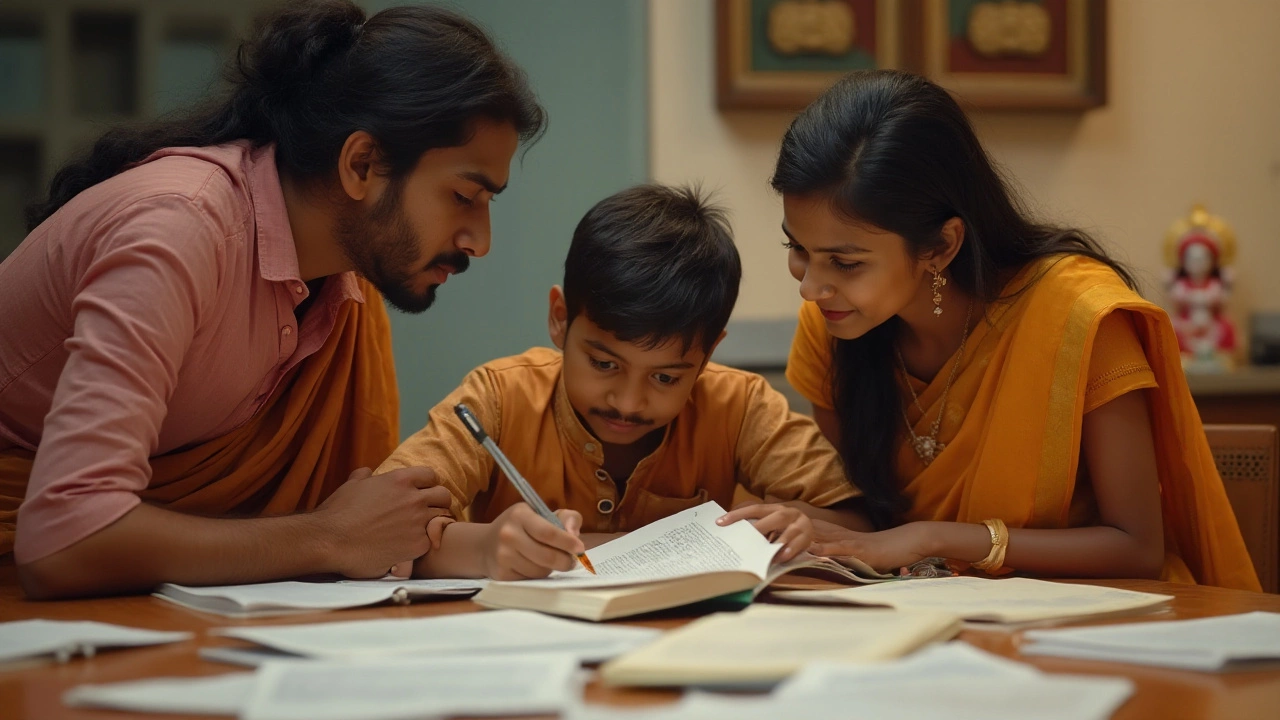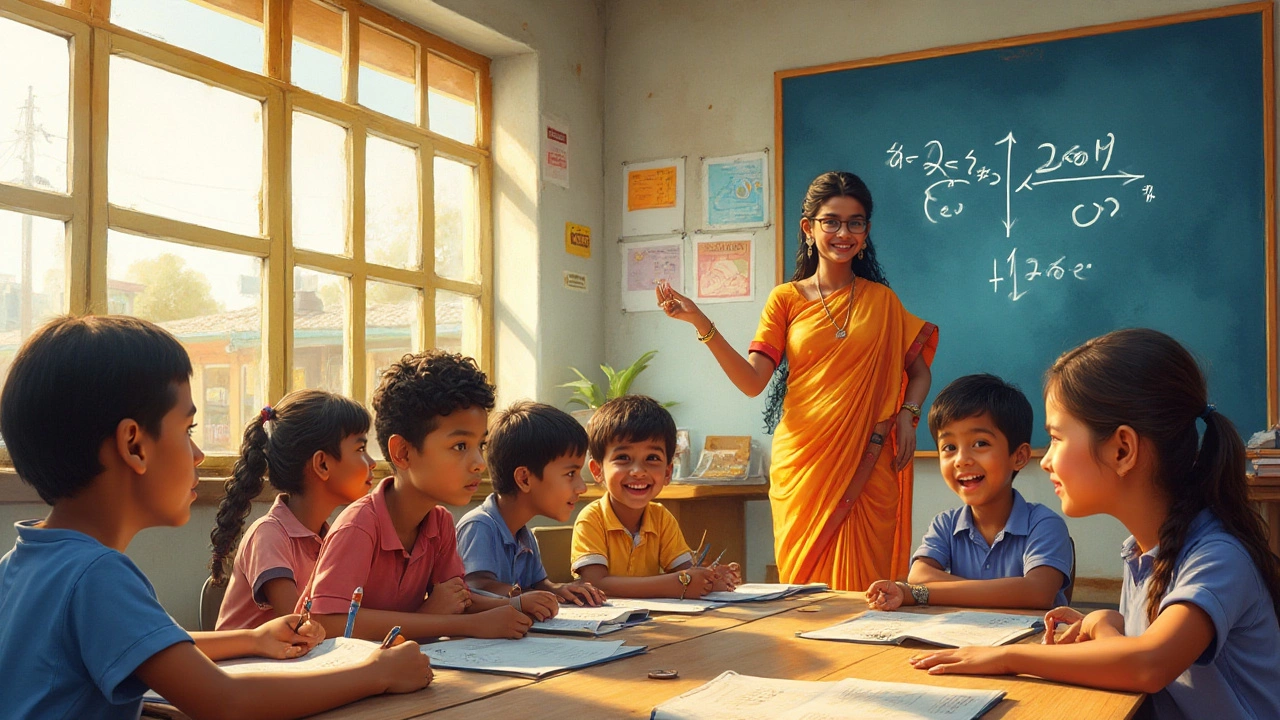Choosing the right educational board is a crucial decision for any parent concerned about the future of their children. The Central Board of Secondary Education (CBSE) in India has emerged as a popular choice. Why? Because it promises a robust structure fostering both academic excellence and personal growth.
Over the years, CBSE has carved out a niche for itself, becoming synonymous with quality education. But what makes it so preferred? The answer lies in its meticulously crafted syllabus that not only meets academic standards but also emphasizes understanding over rote memorization.
- Comprehensive Curriculum Design
- Alignment with Competitive Examinations
- Focus on Practical Learning
- Recognition and Global Reach
- Holistic Student Development
Comprehensive Curriculum Design
The CBSE syllabus is celebrated for its comprehensive curriculum design, a cornerstone for its widespread popularity across India and internationally. To start with, it follows a well-structured framework that updates regularly to include recent advancements in various fields of study. This ensures the students are not just keeping track of current information but are also developing an understanding that is both deep and broad. The curriculum is crafted in such a way that it covers a wide array of subjects meticulously—from languages and mathematics to social sciences and environmental studies, each is given due importance.
One of the defining features of the CBSE syllabus is its focus on concept-based learning. Every topic is broken down into smaller, comprehensible parts that are designed to promote critical thinking and reasoned analysis rather than rote memorization. This not only helps in building a strong academic foundation but also enhances problem-solving skills which are crucial for tackling real-life challenges. The books and study materials used in CBSE challenge students to think, question, and explore, thereby nurturing inquisitive minds ready to engage with the world in novel ways. According to Dr. Ramesh Pokhriyal, former Union Education Minister of India, "CBSE has consistently focused on enriching students with knowledge that extends beyond textbooks."
Importantly, the education board integrates values and ethics within the curriculum, aiming to develop responsible citizens who are aware of societal issues. This is reflected in subjects such as environmental education and life skills sessions that emphasize emotional intelligence and ethical decision-making. Through various initiatives, CBSE also emphasizes sports and physical training, honing not just academic skills but ensuring holistic development. It is this balance between scholastic aptitude and life skills that sets the CBSE syllabus apart, providing a nurtured ecosystem for students to thrive intellectually and personally.
Another aspect worth noting is the inclusion of technology and digital literacy, which modern times demand. The CBSE has included elements of computer science and information technology right from the primary levels, preparing the students to become adept with technological advancements at a young age. Additionally, through smart classrooms and e-learning platforms, CBSE encourages interactive and dynamic learning environments. The periodic integration of online assessments has also been hailed as a step toward a more future-ready education system.
CBSE’s commitment to a well-rounded academic experience is further evidenced by its openness to feedback and reforms. With inputs from educators, parents, and policy-makers, the curriculum periodically evolves to include emerging trends in global education. Such inclusiveness bolsters the confidence of schools and parents in choosing CBSE for their children. A recent survey by the Educational Testing Center highlighted that over 90% of parents are satisfied with the curriculum design and found it suitable for their children's educational journey.
Alignment with Competitive Examinations
The Central Board of Secondary Education (CBSE) has a unique orientation towards national competitive exams, which provides students with a robust foundation for exams such as the Joint Entrance Examination (JEE) and the National Eligibility cum Entrance Test (NEET). The CBSE syllabus is molded in a way that aligns closely with these prestigious exams, ensuring students are prepared well before they actually appear for these tests. The emphasis on core subjects such as Mathematics, Physics, Biology, and Chemistry facilitates a deeper understanding, making complex concepts easier to grasp. Parents and educators often echo that CBSE acts as a stepping stone towards achieving dreams of entering premier institutions across India.
This alignment is achieved through a curriculum that encourages application-based learning rather than rote memorization. Students engaged with the CBSE syllabus are often more adept at problem-solving and critical thinking, skills that are essential in tackling competitive exams. This approach allows students not only to memorize facts but to apply their knowledge in new and varied contexts. In many respects, the teaching methods incorporated by CBSE push students to explore beyond textbooks, steering them towards a journey of discovery and inquiry.
Moreover, the board ensures its course content stays updated. According to research conducted by educational experts, CBSE continually revises its textbooks and syllabi to reflect the latest advancements in various fields. This incessant endeavor to stay relevant makes it an obvious choice for aspiring engineers and doctors. The curriculum is supplemented with ncert books, which have been highly praised for their clarity and comprehensive coverage of essential topics. Their design helps students switch seamlessly between high school learning and competitive exam preparation, a transition that has historically been challenging for many.
According to Dr. Anil Swarup, former Secretary of School Education, government policies supporting syllabus standardization help students secure a stronger footing for competitive exams. "The aim is to minimize the burden while maximizing potential," he has been quoted as saying in a BBC education feature.
Importantly, CBSE's pedagogical strategies include regular practice papers and mock tests. This takes some pressure off students by familiarizing them with exam formats, question types, and time management skills—all crucial for exams like JEE and NEET. Many teachers within the system promote peer-to-peer learning, where students can engage with each other’s perspectives and problem-solving approaches. It's through these collaborative sessions that many develop the confidence to tackle challenging entrance exams head-on.
Given the immense pressure and competition for spots in top colleges, the strategic alignment of the CBSE curriculum stands out as a significant advantage. The board's effort in cooperating closely with educational bodies and entrance test organizers frames an efficiently synchronized educational path. Statistics from a 2023 survey show over 70% of students from a CBSE background feeling well-prepared for entrance exams compared to their peers from other boards.
In a landscape where higher education can dictate professional futures, CBSE's tailored approach through curriculum and assessment methods undoubtedly bolsters the expectations and ambitions of countless students. As a system underlined by a synergy of strong foundational learning and future aspirations, it continues to be a preferred pathway for India’s youth.

Focus on Practical Learning
One significant advantage of the CBSE syllabus is its emphasis on practical learning. This approach ensures that students do not merely absorb information but actively engage with it. The curriculum is designed with a balance of theoretical knowledge and practical application, preparing students for real-world challenges. For instance, subjects like Science and Mathematics feature numerous lab exercises and experiments, encouraging students to explore concepts hands-on. Such experiences not only demystify complex topics but also build critical thinking and problem-solving skills.
The idea is to convert classrooms into interactive learning spaces where abstract ideas transform into tangible experiences. This approach has been backed by educational experts who argue that practical learning fosters a deeper understanding of the subject matter. In the words of educational psychologist David Kolb, "Learning is the process whereby knowledge is created through the transformation of experience." This philosophy is woven into the education fabric of CBSE, aligning theoretical aspects with tangible outcomes.
CBSE schools often integrate projects and group activities that promote teamwork and communication skills. Students are encouraged to take part in workshops, field trips, and exhibitions. These activities provide firsthand experiences that are crucial in developing a well-rounded personality. This holistic approach ensures students are not only limited to textbook learning but exposed to multifaceted educational experiences.
Real-World Relevance
Incorporating real-world applications within the syllabus helps students understand the relevance of what they learn. Take, for example, environmental studies—a subject where CBSE students might conduct field surveys or create projects that address local environmental issues. Such ventures motivate them to apply classroom learning to everyday life, fostering a culture of innovation and proactive thinking. The connection between education and life beyond school walls becomes evident, preparing youth for various professional realms.
Moreover, practical learning aids students in increasing their retention capabilities. Studies have shown that information retention improves when students are actively involved in the learning process. Hands-on activities reflect this approach, making CBSE a distinguished choice for many parents. This engagement with the material enhances memory retention, leading to better academic performance and personal development.
Recognition and Global Reach
The CBSE curriculum is widely acknowledged for its high standards and systematic approach to learning. Schools that follow the CBSE syllabus are recognized not only across India but also in numerous countries around the world. This has led to an extensive network of CBSE-affiliated schools globally, which ensures that students have the benefit of receiving a consistent and high-quality education irrespective of where they reside.
One of the notable aspects of CBSE's reach is its adaptability across geographical boundaries. This makes transitioning for students much simpler if they move between states in India or even internationally. The adaptability factor gains importance when considering how families nowadays are more mobile, whether for jobs or other reasons. Schools in countries like the United Arab Emirates, Singapore, and Malaysia, among others, have adopted CBSE, providing Indian expatriates and other students access to a recognized standard of education.
The board's global reach has often been a topic of roadmaps in various educational discussions. According to a report by the Department of School Education, CBSE-affiliated schools are present in over 25 countries, serving more than 200,000 students overseas. This clearly exemplifies how CBSE serves as a bridge in not just cultural exchange but also in educational cohesiveness.
"The CBSE syllabus equips students to not only excel in academics but also prepares them for the global stage," remarked Anil Swarup, a former Secretary at the Department of School Education.
The school board's efforts in making learning holistic and universally acceptable have led to increasing interest from various educational sectors worldwide. As the globe becomes more interconnected, having a CBSE education means students are prepared to face international standards and challenges effortlessly. A key determinant in such accomplishments is CBSE's educational methodology, which focuses on critical thinking, analytical skills, and practical knowledge, making students globally competent and ready for higher education both domestically and internationally.

Holistic Student Development
When it comes to nurturing future-ready individuals, the CBSE syllabus plays an indispensable role. It doesn't just focus on academic knowledge, but on the comprehensive development of students. The system encourages them to engage in a wide range of activities, aiming for a balance between intellectual growth and personal development. Starting from primary classes, the syllabus incorporates co-curricular activities like sports, arts, and debates, facilitating the growth of diverse skills. Emotional intelligence and social skills are two crucial aspects that the syllabus subtly interlaces through group projects and collaborative learning sessions. This way, students not only sharpen their minds but also enhance their ability to work in teams, a skill indispensable in today's workforce.
One of the key strategies employed by the CBSE is promoting an analytical mindset. Education in a CBSE school is infused with subjects like Science and Mathematics that are not only theoretically rich but also practically engaging. The standards set by CBSE ensure that students develop a strong foundation in core subjects which later aids them in competitive exams. By doing so, students experience learning that goes beyond textbooks, preparing them to tackle real-world problems with confidence. Student grading is also holistic; it considers both academic performance and participation in extracurricular activities. Education here is treated as a journey rather than a destination, intending to equip students for a lifetime of learning.
Dr. Ramesh Pokhriyal Nishank, former Education Minister, once stated, "Education is not just about degrees and certificates; it's about developing a sense of resilience, a spirit of inquiry, and, most importantly, the ability to dream." This philosophy underpins the CBSE's approach to holistic education.
Additionally, the CBSE has been continually updating its curriculum to include life skills education, disaster management, and health and nutrition. These subjects are taught not as add-ons but as integral components of the student's education. Recognizing the global challenges today's youth face, CBSE also places significance on teaching sustainable development goals as part of their humanities syllabus. The introduction of these subjects indicates CBSE's foresight in equipping students with knowledge that's not only relevant today but essential for the future.
The board's commitment to students extends beyond the classroom, as seen through initiatives like community service projects. By requiring students to contribute to their communities, CBSE schools instill a sense of social responsibility and leadership among students. Furthermore, access to counseling services ensures that the emotional and psychological health of students is always prioritized. Such comprehensive systems demonstrate CBSE's unwavering goal: to raise students who are knowledgeable, balanced, and prepared to be responsible citizens of the world.




